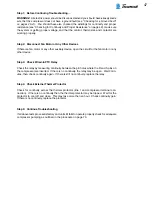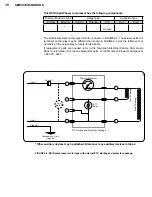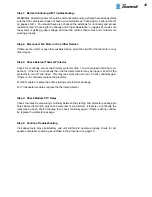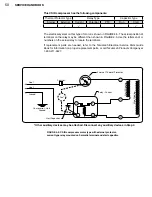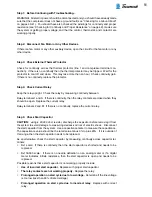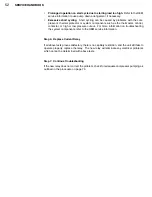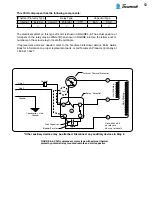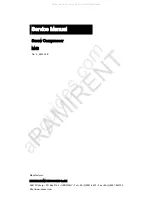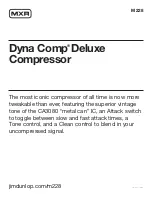
61
to the OEM service information.
•
Vibration due to loose relay mounting.
Tighten relay mounting.
•
Use of incorrect run capacitor.
Replace with proper run capacitor.
Step 5: Check Start Capacitor
CAUTION:
using a 20,000 ohm resistor, discharge the capacitor before removing it from
the system to avoid damage to measuring devices and risk of electric shock.
Disconnect the start capacitor from the system. Remove the bleed resistor. Use a capaci-
tance meter to measure the capacitance. The capacitance value should be the rated value
minus 0% to plus 20%. If it is outside of this range, then the start capacitor needs to be
replaced.
As an alternative, check the start capacitor by measuring continuity across the capacitor
terminals.
Using the Rx1 ohm scale: If there is continuity the start capacitor is shorted and needs to
be replaced.
Using the Rx100,000 ohm scale: If there is no needle deflection on an analog meter or if a
digital meter indicates infinite resistance, then the start capacitor is open and needs to be
replaced.
Possible reasons that a start capacitor is not working properly include:
•
Use of incorrect start capacitor.
Replace with proper start capacitor.
•
The relay contacts are not working properly.
Replace the relay.
•
Prolonged operation on start cycle due to low voltage. Determine if the line volt-
age is too low
(less than 90% of rated voltage)
.
•
Prolonged operation on start cycle due to incorrect relay.
Replace with correct
relay.
•
Prolonged operation on start cycle due to starting load too high.
Refer to the OEM
service information to use pump down arrangement if necessary.
•
Excessive short cycling.
Short cycling can be caused by problems with the com-
pressor’s thermal protector or system components such as the thermostat, control,
contactor, or high or low pressure cut-out. For more information on troubleshooting
the thermal protector, see Step 2. For troubleshooting the system components, refer
to the OEM service information.
Step 6: Replace Potential Relay
If all above tests prove satisfactory, there is no capillary restriction, and the unit still fails to
operate properly, replace the relay. The new relay will eliminate any electrical problems
which cannot be determined with above tests.
Step 7: Continue Troubleshooting
If the new relay does not correct the problem, check for adequate compressor pumping as
outlined in the procedure on page 70.
Содержание AH5540E
Страница 1: ...Hermetic Compressor Service Handbook Wholesale Distribution North America...
Страница 2: ......
Страница 3: ...Hermetic Compressor Service Handbook Ann Arbor MI 48108 REV 3 11...
Страница 4: ......
Страница 8: ......
Страница 9: ...Chapter 1 General Service Safety Precautions...
Страница 16: ......
Страница 17: ...Chapter 2 Model and Application...
Страница 22: ......
Страница 23: ...Chapter 3 Compressor Motor and Component...
Страница 36: ......
Страница 37: ...Chapter 4 Servicing...
Страница 38: ...30 SERVICE HANDBOOK...
Страница 79: ...71...
Страница 80: ......
Страница 81: ...Chapter 5 Installation and Replacement...
Страница 96: ......
Страница 97: ...Liquid refrigerant migration to compressor FIGURE 6 1 Chapter 6 Operation...
Страница 108: ......
Страница 109: ...Appendix...
Страница 113: ...105 Reciprocating Compressor FIGURE A 2 Internal view of typical air conditioning compressor...
Страница 118: ...110 SERVICE HANDBOOK Notes...
Страница 119: ......

